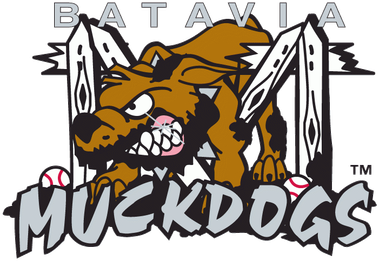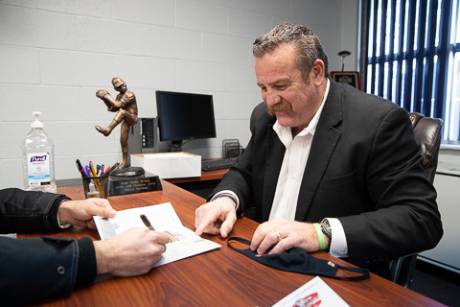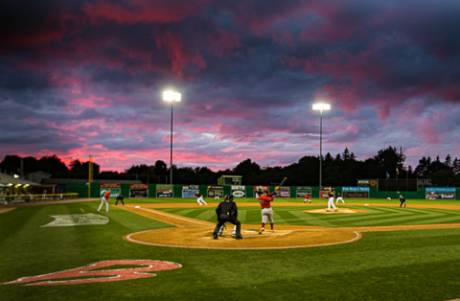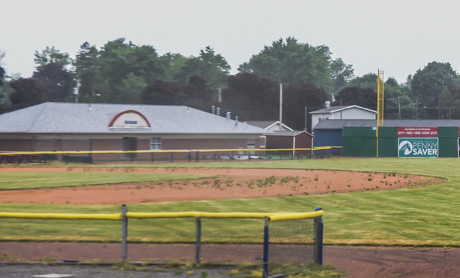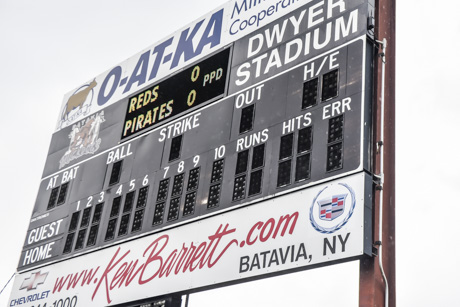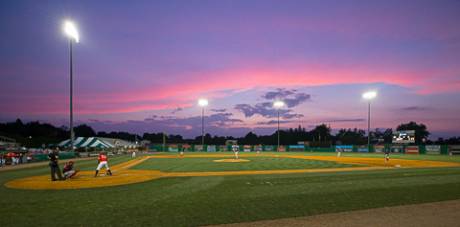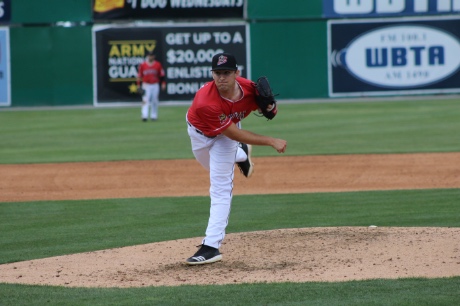Press release:
WASHINGTON, D.C. – Today (Jan. 27) representatives Lori Trahan (D-MA), David McKinley (R-WV), Max Rose (D-NY), and Mike Simpson (R-NY), co-chairs of the "Save Minor League Baseball Task Force" -- introduced a bipartisan resolution expressing the sense of Congress that Major League Baseball (MLB) should maintain the current Minor League structure rather than proceed with its plan to eliminate 42 Minor League clubs, including the Batavia-based Muckdogs.
Congresswoman Lori Trahan said: “We launched the Save Minor League Baseball Task Force for a simple purpose -- to help ensure a level playing field in the negotiations between MLB and Minor League Baseball so that they yield a fair resolution and protect Minor League Baseball in communities across the country. Congress has long been a partner to the league in protecting and expanding America’s favorite pastime. We deserve to have our voices heard in any conversation with such potentially devastating consequences. This resolution makes our position clear, and I am grateful to my fellow co-chairs and colleagues for their continued support of this effort."
Congressman David McKinley said: “Minor League Baseball teams have had a major impact on small communities. These teams provide an enormous cultural and economic benefit to the communities they call home. The goal of our involvement in this fight is to ensure a level playing field in the negotiations between Major League Baseball (MLB) and MiLB. Doing away with 42 teams is not a reasonable solution. We are hopeful that MiLB and MLB can find acompromise that will preserve the 42 MiLB teams and address MLB’s concerns.”
Congressman Max Rose said: “The value that Minor League Baseball adds to our communities goes so far beyond entertainment. Teams like the Staten Island Yankees offer youth clinics for our kids, donate to local schools and charities, and volunteer countless hours to help those in need. This resolution sends a clear message that we recognize those contributions, and that I’m going to do everything in my power to protect the Staten Island Yankees."
Congressman Mike Simpson said: “Minor League Baseball is at the heart of small towns all across rural America. The proposal to cut 42 teams will leave communities like Idaho Falls without affordable and accessible options for families to experience America’s pastime. I am pleased to join my colleagues in introducing this resolution which expresses more than 60 members of Congress opposition towards eliminating the Chukars and other Minor League organizations. I hope Major League Baseball takes the concerns of fans in small-town America seriously when considering the current proposal.”
Congressman Joe Courtney said: “The proposal to eliminate our Norwich Sea Unicorns and 41 other Minor League teams across the country is a profound mistake. Countless baseball fans ofall ages attend MiLB games each season, and for many, It’s their only chance to see our nation’s pastime in a family-friendly, affordable atmosphere. There have been well over half a million statistical errors committed in the MLB since its founding in 1896, but this plan to do away with a quarter of all our Minor League teams ranks among the worst of them – it will cost American communities jobs, and more importantly it will cost us in quality of life. The House is leading the charge to protect our Minor League Baseball teams, and I’m proud to be part of this bipartisan effort. MLB Commissioner Manfred and his team need to take a hard second look at their proposal, and consider what it could mean for the long-term support that Congress hasalways afforded to the MLB on a variety of issues.”
Congressman Tim Ryan said: “The Mahoning Valley Scrappers are a pillar of our community and provide an affordable and fun way for families to spend time together. These Minor League teams are an integral part of American baseball. Not only do they offer a pipeline to the MLB, they stand as a cultural cornerstone in communities like mine. I’m 100 percent with the Scrappers because I know that in the Mahoning Valley, the best days for America’s pastime are yet to come.”
Congressman Andy Barr said: “Minor League Baseball provides so much to our local communities, bringing family friendly entertainment, job opportunities and a significant economic impact to every city a team calls home. The impact of the Lexington Legends is no exception. The 2019 South Atlantic League Champion Legends bring an average economic impact of $47.2 million per year to my community and, in addition, donate an average of $1 million locally. I am committed to doing what I can to support the Legends and ensure that they stay in Lexington for years to come.”
Congressman Phil Roe said: “With five teams in our region, perhaps no area in America would be more affected by the proposed restructuring of Minor League Baseball than East Tennessee. Baseball is an integral part of so many communities, and a significant source of community pride and entertainment. I will do everything I can to ensure America’s pastime is preserved for generations to come across East Tennessee. That is why I am proud to join my colleagues in introducing a bipartisan resolution to help preserve Minor League Baseball in 160 communities across the nation."
Congressman John Moolenaar said: "Michigan families love spending their summers outside watching baseball and our minor leagueteams have fans throughout the state. It is my hope that Major League Baseball and its Minor League affiliates reach an agreement that is good for teams in Michigan and across the nation."
Congressman Anthony Brindisi said: "The proposal by Major League Baseball to eliminate Minor League teams, like New York’s Binghamton Rumble Ponies, is a big swing and a miss. Minor League Baseball and the communities that support it are part of the fabric of America and its favorite pastime. I joined my colleagues, from both parties, to call on Major League Baseball to work with Minor League Baseball and preserve affordable, family friendly fun. As a lifelong baseball fan and New Yorker, I am not going to sit on the bench in this fight. We need to keep the Rumble Ponies inBinghamton and help save Minor League Baseball."
Congressman Mike Kelly said: “Minor League Baseball teams are a crucial part of America’s pastime, and they provide affordable entertainment options for working families across our country. Major League Baseball’s plan to cut ties with 42 Minor League teams, including Erie’s beloved SeaWolves, would be devastating to millions of baseball loving Americans. I am a proud co-sponsor of this resolution that urges MLB to reconsider. It would be tragic to lose these teams."
Pat O’Conner, president, MiLB said: “Minor League Baseball is most appreciative of the bipartisan support we have received from so many members of Congress. The resolution introduced today shows the widespread support for Minor League Baseball and we thank representatives McKinley, Rose, Simpson and Trahan for leading the charge in support of Minor League Baseball.”
Congress: "Unified Opposition to MLB plan"
On Nov. 19, more than 100 members of Congress joined together on a letter to MLB expressing our unified opposition to the MLB plan. This resolution is a further demonstration that Minor League clubs – and the communities for which they play – are not without support in Congress.
Furthermore, it reflects Congress’s legitimate interest in ensuring fair negotiations between MLB and MiLB.
MLB’s plan was offered in spite of the fact that Minor League Baseball (MiLB) just completed its 15th consecutive season with an attendance above 40 million; and it was the ninth-largest single season total in MiLB’s 100-plus year history.
Many of the Minor League clubs would fail without a PDC—leaving as many as 1,200 players out of work. The plan is a betrayal of the fans, players, municipalities, stadium vendors and employees who have supported these clubs for decades.
Text of the resolution is below:
RESOLUTION
Supporting Minor League Baseball, and for other purposes.
Whereas 40 million plus fans have attended Minor League Baseball games each season for 15 consecutive years;
Whereas Minor League Baseball provides wholesome affordable entertainment in 160 communities throughout the country;
Whereas, in 2018, Minor League Baseball clubs donated over $45 million in cash and in-kind gifts to their local communities and completed over 15,000 volunteer hours;
Whereas the economic stimulus and development provided by Minor League Baseball clubs extends beyond the cities and towns where it is played, to wide and diverse geographic
areas comprising 80 percent of the population in the Nation;
Whereas Minor League Baseball is committed to promoting diversity and inclusion through its Copa de la Diversión, MiLB Pride, FIELD Program, and Women in Baseball Leadership initiatives;
Whereas Minor League Baseball is the first touchpoint of the national pastime for millions of youth and the only touchpoint for those located in communities far from Major League cities;
Whereas Congress has enacted numerous statutory exemptions and immunities to preserve and sustain a system for Minor League Baseball and its relationship with Major League Baseball;
Whereas abandonment of 42 Minor League Baseball clubs by Major League Baseball would devastate communities, bond purchasers, and other stakeholders that rely on the economic stimulus these clubs provide;
Whereas Minor League Baseball clubs enrich the lives of millions of Americans each year through special economic, social, cultural, and charitable contributions; and
Whereas preservation of Minor League Baseball in 160 communities is in the public interest, as it will continue to provide affordable, family friendly entertainment to those communities:
Now, therefore, be it Resolved,
That the House of Representatives—
(1) supports the preservation of Minor League Baseball in 160 American communities; (2) recognizes the unique social, economic, and historic contributions that Minor League Baseball has made to American life and culture; and
(3) encourages continuation of the 117-year foundation of the Minor Leagues in 160 communities through continued affiliations with Major League Baseball.
Original co-sponsors (co-leads bolded): Representatives Axne, Banks, Barr, Bishop, Blunt Rochester, Bonamici, Brindisi, Brown, Budd, Burchett, Cisneros, Cline, Comer, Courtney,Cunningham, DeFazio, Escobar, Finkenauer, Fitzpatrick, Fleischmann, Fudge, Gianforte, Griffith, Guthrie, Haaland, Higgins, Horsford, Joyce (OH), Kaptur, Katko, Keating, Keller, Kelly, Kennedy, Lamborn, Larsen, Loebsack, Lynch, Matsui, McCollum, McKinley, Miller, Moolenaar, Morelle, Moulton, Newhouse, Pocan, Price, Raskin, Riggleman, Roe, Rogers, Rose, Ryan, Schrader, Serrano, Simpson, Slotkin, Thompson, Tipton, Trahan, Trone, Turner, Underwood, Wasserman Schultz, and Welch.

